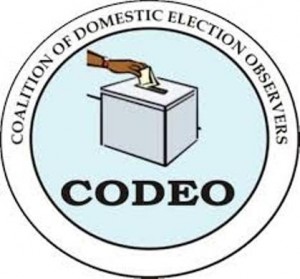Assembly aspirants in promise sprees – CODEO
 An observatory report by the Coalition of Domestic Election Observers (CODEO) on the 2015 District Level Elections showed that aspirants were involved in “promise sprees,” including the provision of basic amenities to the electorate.
An observatory report by the Coalition of Domestic Election Observers (CODEO) on the 2015 District Level Elections showed that aspirants were involved in “promise sprees,” including the provision of basic amenities to the electorate.
They promised the construction of toilet facilities, markets, roads, provision of good drinking water and street lights.
Others were organizing communal labour for community cleaning and ensuring the clearing of choked gutters and refuse dumps, sustainable and all inclusive development, the Coalition said.
Professor Miranda Greenstreet, Co-Chair of CODEO, delivering the report at a press conference in Accra, said the Coalition also noted worrying signs of both covert and overt intrusion of political parties in the elections process.
The parties either supported a candidate, or a candidate associated himself or herself with a political party.
According to the report, members of the public expressed their lack of interest in the district elections, and pointed out that they were either not aware of, or did not know much about the elections.
Prof Greenstreet said some members of the public also displayed limited knowledge on the concept of local governance and consequently, the need for them to vote in the local government elections, adding that Civil Society Organizations and the media had not given the necessary attention to local government elections, as much as they gave to the presidential and general elections.
“CODEO equally expresses concerns with the delays associated with the conduct of the elections and wonders if the delays do not have political and legal implications for our local government structures, their performance and governance”, she said.
Prof Greenstreet disclosed that the Coalition had trained 700 election-day observers who were being deployed to all the 10 regions of the country to watch over the polls.
The Co-Chair said people were required to observe the quality of the voting process, the conduct of election officials, and the participation of marginalized groups with 200 observers, who constituted CODEO’s Roaming Observers to move from polling stations to report on any incidents they came across.
Prof Greenstreet stressed that there were critical incident desks mounted at the CODEO Observation Centre where reports about irregularities, disruptions, and other negative incidents in the voting process were received and quickly processed and relayed to the Ghana Police Service, the Electoral Commission, and any other relevant state institutions for prompt redress.
The project districts included Ekumfi, Awutu Senya, Ledzokuku-Krowor, North Tongu, Afigya-Kwabre, Assin South, Ga South, Ga West, Ablekuma, Offinso, Kwahu Afram Plains, Asante Akyem North, Obuasi, Yendi, Shama, Gonja, Chereponi, Dormaa, Savelugu, Nanumba North, Bolgatanga, Builsa, Sekyere East, Bosome Freho and Yilo Krobo.
CODEO was formed in May 2000 under the auspices of the Ghana Centre for Democratic Development, with the primary objective of mobilizing Ghanaians to contribute towards the promotion of free, fair and transparent elections.
The Coalition, having received support from the United States Agency for International Development, implemented a number of activities in support of the September 1 District Level Elections.
The Coalition recruited, trained and deployed 86 women as Peer Educators and Long-Term Observers to 86 selected project districts, to sensitize the general public, particularly women, youth and persons with disabilities, on the concept of local government and the need for them to get involved.
Source: GNA
